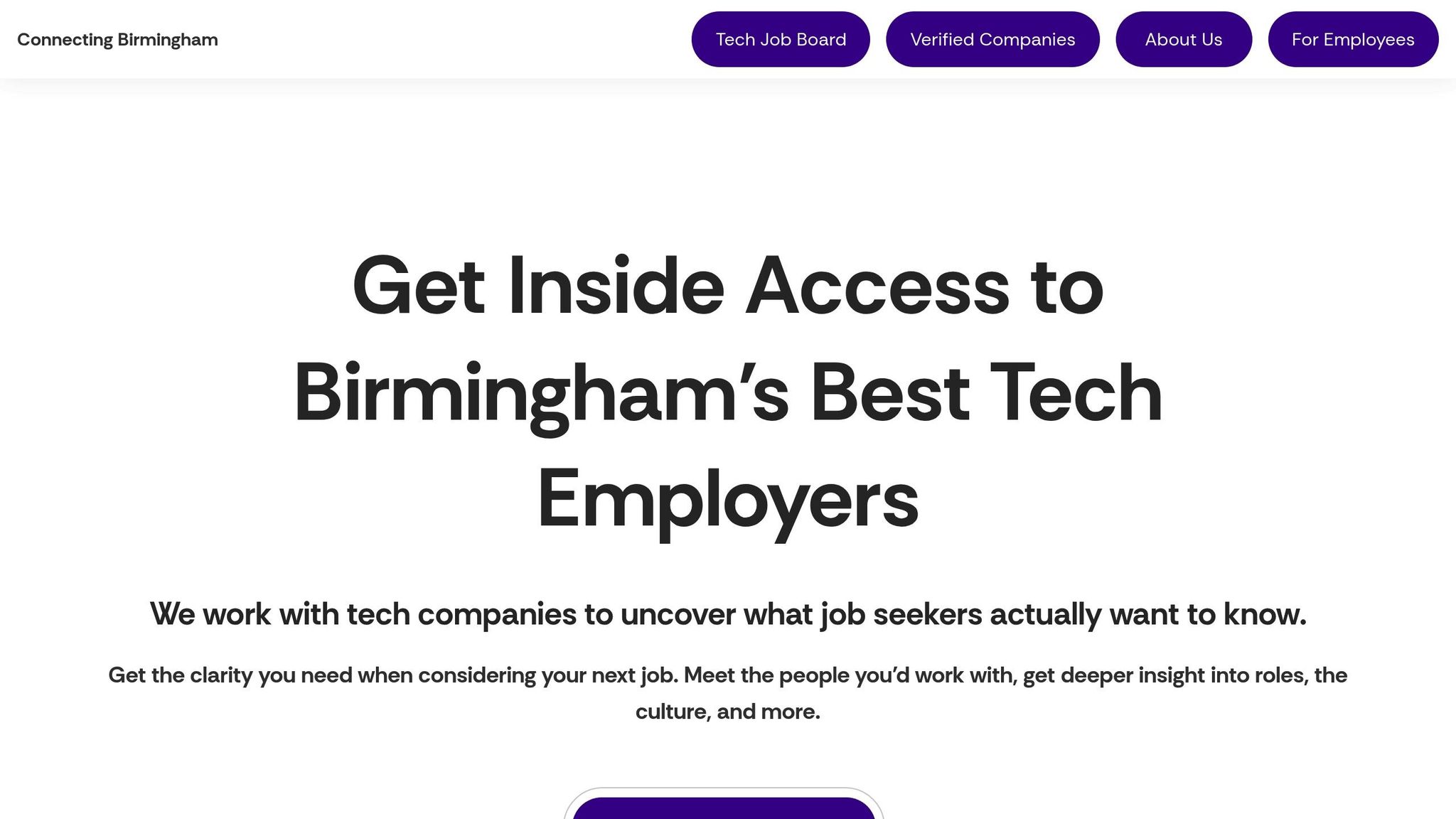Birmingham has emerged as a thriving hub for the UK's tech industry, showcasing rapid growth in jobs, investment, and innovation. Here's what you need to know:
- Job Growth: Birmingham's tech workforce has grown by 152% between 2014 and 2023, with 56,000 tech professionals now working in the city. By the end of 2025, the region is set to add 52,000 digital tech jobs.
- Salaries: Average salaries for tech roles like AI Engineers (£52,000) and Software Engineers (£42,700–£58,600) reflect the high demand for skilled professionals.
- Top Roles: In-demand positions include Software Engineers, AI Engineers, Data Analysts, Machine Learning Engineers, and Cybersecurity Specialists.
- Investment: In 2023, the city led the UK in Foreign Direct Investment projects outside London, creating 7,000 jobs.
- Education and Talent: With 132,000 students in the West Midlands, Birmingham benefits from a steady pipeline of skilled graduates.
- Key Employers: Major companies hiring include BT, Deloitte, Autodesk, and Coinbase, offering hybrid and remote roles.
To succeed in Birmingham’s competitive tech sector, focus on building skills in AI, cybersecurity, and cloud computing. Networking at events like Birmingham Tech Week and tailoring applications to local employers can also give you an edge. For verified job opportunities, platforms like Connecting Birmingham are invaluable resources.
From Birmingham start-up to global tech hub – Mark Sheldon and Sidetrade

Current Trends in Birmingham's Tech Job Market
Birmingham's tech scene is undergoing a significant transformation as new technologies and work models reshape the landscape. Between 2022 and 2024, the city climbed from 24th to 18th place in CBRE's ranking of emerging tech talent markets, signalling its growing importance in the sector. This shift highlights the rise of specialised roles and changing hiring practices.
Growing Demand for Specialist Tech Roles
The surge in demand for artificial intelligence (AI) expertise is reshaping Birmingham’s job market. Colin Yasukochi, executive director of CBRE's Tech Insights Centre, notes that the increasing need for AI skills is driving job creation and will continue to do so into 2025.
This growth is particularly noticeable in Birmingham's cybersecurity and software services industries, which are expanding rapidly. Over the past five years, the city's tech workforce has grown by 3.7%, with average salaries now reaching £76,500 - a 19.5% increase.
Healthcare IT is also making waves in the local market. For instance, Acclinate, a company focused on improving minority representation in clinical trials, announced a project in 2024 that will create 25 new full-time tech positions in Birmingham.
Changes in Employer and Candidate Expectations
As specialised roles grow, companies in Birmingham are refining their hiring strategies. Employers are increasingly selective, prioritising candidates who align with their business goals and values. A shift towards skills-based hiring is evident, with practical abilities often outweighing traditional qualifications.
AI knowledge is now a must-have. A striking 98% of tech professionals express a desire to deepen their AI expertise. Employers are particularly keen on candidates who can apply AI in practical, business-focused ways. At the same time, workplace flexibility remains a top priority, with companies adjusting hybrid work policies to balance employee preferences with collaboration needs.
Steve Ammons, president and CEO of the Birmingham Business Alliance, highlights the city’s approach, stating, "We have our own Birmingham way of developing our tech scene -- Birmingham is founder-focused, which creates a friendlier and more productive environment for innovators to ideate, collaborate and create startups for the future".
This focus on collaboration and cultural fit is shaping the hiring landscape. Companies are also investing heavily in upskilling, offering internal training programmes to ensure teams stay ahead of technological advances.
How National Tech Trends Affect Birmingham
National developments in technology are leaving their mark on Birmingham. The UK government’s £76 billion investment in emerging technologies is already driving local growth, with AI and machine learning expected to contribute 2.98% to the UK’s GDP by 2035.
However, a slowdown in pay rises and job vacancies seen across the UK is also influencing Birmingham. To stay competitive, local employers are shifting their focus to comprehensive benefits packages that include career development opportunities and a strong workplace culture, rather than relying solely on higher salaries.
Hybrid and remote work have become standard expectations, mirroring national trends. This shift has broadened Birmingham’s talent pool, allowing companies to tap into professionals across the UK while keeping local talent accessible. Additionally, diversity and inclusion are becoming key priorities, viewed as essential for long-term success in the tech sector.
These national trends are shaping Birmingham’s vibrant tech ecosystem, reinforcing its position as a key regional hub for innovation and growth.
Most Wanted Tech Roles and Skills in Birmingham
Birmingham’s growing tech sector is grappling with a talent shortage, creating a wealth of opportunities for skilled professionals. As Meg South, IT Account Manager at ITAC Solutions, explains, "If you can code or program, the job market is yours for the taking". This demand for specialised skills has made certain tech roles highly sought after, shaping the future of Birmingham's tech landscape.
Top Tech Roles in 2025
Software Engineers are at the forefront of Birmingham's tech expansion. With the city solidifying its place as a tech hub, companies are on the lookout for developers who can create scalable, high-performance solutions.
Artificial Intelligence Engineers are in particularly high demand. JG Carver, Partner at ITAC Solutions, remarks, "You give me one person that has this skill, and I'm going to have multiple companies bidding on that person". Firms like Devi Technologies and Deloitte are actively hiring AI experts to spearhead their digital transformation initiatives.
Data Analysts play a pivotal role as businesses increasingly rely on data to guide decisions. Jon Auterson, Former IT Recruiter at ITAC Solutions, notes, "Companies want to know how the data moves the business and how it can be secured against fraud or theft". Employers such as JLR and DHL Supply Chain are seeking professionals who can turn raw data into actionable insights.
Machine Learning Engineers are another hot commodity, blending data science with software engineering. Companies like Autodesk are actively recruiting for this role to drive innovation.
Cybersecurity Specialists have become indispensable, particularly as 52% of UK businesses have reported cyber-attacks in the last five years. As Birmingham’s tech ecosystem continues to grow, safeguarding digital assets has never been more critical.
These roles not only address current needs but also position professionals to tackle the challenges of tomorrow.
Required Technical and Soft Skills
Birmingham’s tech landscape reflects global trends, with a strong emphasis on technical expertise. Proficiency in programming languages like Python and Java is highly valued, with entry-level Java developers earning an average of £50,375 annually. Knowledge of cloud platforms is increasingly important, as 89% of major UK firms now use at least one cloud service. Gaining hands-on experience with cloud environments and containerisation tools can significantly boost employability.
However, technical skills alone aren’t enough. Soft skills are becoming a top priority, with 74% of companies placing a high value on them by 2025. Zohra Huda, Editor of Startups.co.uk, highlights this trend: "We’d expect 'softer' sectors such as creative and healthcare to hire for soft skills, but our Workforce Report revealed a surprising shift in 'harder' industries' hiring styles". Emotional intelligence is particularly prized, with teams demonstrating high emotional intelligence performing 30% better than those with lower levels. Employers are also looking for problem-solving abilities (valued by over 90% of firms), adaptability (80%), and teamwork (89%).
Project management is another area gaining traction. Certifications like PMP or PRINCE2, combined with a portfolio of successful projects, can give candidates a competitive edge. These skills are often reflected in the attractive salary packages offered across Birmingham.
Salary Ranges and Local Employers
Birmingham’s tech salaries highlight the skills shortage and the city’s growing reputation in the industry. Compensation varies based on experience and specialisation, but the figures are competitive.
| Role | Average Salary Range (GBP) | Local Employers |
|---|---|---|
| Software Engineer | £42,700 - £58,600 | BT, Transoft Solutions, Sidetrade |
| Data Analyst | £27,254 - £41,816 | JLR, DHL Supply Chain, Midland Heart, PwC, Airband |
| AI Engineer | £52,000 (UK Average) | Devi Technologies, Deloitte |
| Machine Learning Engineer | £59,000 (UK Average) | Autodesk |
Top employers in Birmingham are actively hiring. BT Group, for instance, is recruiting Software Engineers and Lead Data Engineers for hybrid roles. Deloitte is on the lookout for Artificial Intelligence Business Analysts and Delivery Managers, while Autodesk is seeking Senior Machine Learning Engineers. Most major employers now offer hybrid work models, combining the flexibility of remote work with in-office collaboration.
sbb-itb-1ad140f
Leading Tech Employers and Job Platforms in Birmingham
Birmingham's tech scene is thriving, thanks to a mix of global companies and ambitious startups that call the city home. Its location in the West Midlands makes it a hub for businesses seeking skilled professionals, creating a dynamic job market.
Birmingham's Major Tech Companies
Birmingham boasts a strong lineup of tech employers across various industries. PwC is a prominent recruiter, offering senior-level roles like CTIO-Solution Architect-Senior Manager. These hybrid positions, with salaries ranging from £91,000 to £322,000 annually, focus on cloud-native application development and require expertise in areas like AI, AWS, Azure, and machine learning.
Motorola Solutions has also carved out a significant presence in the city. They hire System Support Engineers for hybrid roles, with salaries between £64,000 and £128,000 per year. These positions involve providing technical support for public safety software and demand skills in Linux, networking, cybersecurity, and CRM software.
The financial technology sector shines through employers like The PNC Financial Services Group, which offers Product Manager roles with salaries from £65,000 to £133,000 annually. These jobs focus on driving business results through technology, covering areas such as payments, security, and machine learning.
Coinbase brings its cryptocurrency and blockchain expertise to Birmingham, offering some of the highest-paying roles in the city. Their Staff Machine Learning Engineer positions, focused on AI platforms, offer salaries between £218,000 and £257,000 annually. Mid-level Machine Learning Engineers can expect £152,000 to £179,000 per year. These remote roles centre on building AI infrastructure and applying advanced machine learning techniques.
In the healthcare tech sector, UAB Medicine regularly hires for positions like Systems Administration Architect and IT Project Manager II, adding to the city’s diverse tech opportunities.
These companies highlight Birmingham’s vibrant tech ecosystem and the need for platforms that connect professionals with these exciting opportunities.
Connecting Birmingham: Your Local Job Platform

For tech professionals in the city, Connecting Birmingham is a go-to resource for finding verified job opportunities. Unlike general job boards, this platform is tailored specifically to Birmingham's tech industry, offering a curated selection of roles and verified company profiles. This ensures job seekers get accurate insights into potential employers.
The platform’s standout feature is its local focus. Employers are vetted before posting jobs, so candidates only encounter genuine opportunities. This approach has attracted prominent Birmingham-based companies like Intercity, Daisy, Callstream, Application Packaging, and SpeechWrite.
Another key advantage is the platform’s emphasis on company culture insights. Beyond listing job requirements, it provides details about team dynamics, work environments, and company values. This transparency helps candidates make informed decisions about where to apply.
Job seekers can also benefit from regular job alerts, keeping them up to date with new opportunities. Best of all, these features are available for free, making it an accessible tool for anyone looking to enter or advance in Birmingham's tech sector.
How to Use Connecting Birmingham
Making the most of Connecting Birmingham is straightforward. Here are a few tips to maximise its potential:
- Dive into company profiles to understand employers before applying.
- Set up job alerts for positions and organisations that interest you.
- Use research tools to tailor your applications and prepare for interviews.
The platform’s local focus makes it an excellent resource for understanding Birmingham’s tech landscape. You can learn which companies are expanding, what technologies they’re prioritising, and how they fit into the city’s broader tech scene. Whether you're new to the area or a seasoned professional, Connecting Birmingham can help you navigate the local job market with confidence.
How to Succeed in Birmingham's Tech Job Market
Breaking into Birmingham's tech scene requires more than just technical know-how. To make your mark, focus on building strong connections, tailoring your applications, and keeping your skills sharp. Here's how to navigate and succeed in this dynamic industry.
Building Your Professional Network
One of the best ways to get ahead in Birmingham's tech sector is by tapping into its vibrant community. Networking events can open doors, connect you with like-minded professionals, and even lead to job opportunities.
Take Birmingham Tech Week, for instance. It's a major event packed with activities like the Opening Tech Social, Digital Skills Symposium, Women in Tech Day, AI Symposium, and the Engineering & Developer Conference. It's the perfect chance to meet industry leaders and peers alike. Similarly, Sloss.Tech in June 2025 offers a more focused experience, complete with workshops, pitch competitions, and startup showcases. It even includes an app to help you personalise your experience and connect with other attendees.
For women in tech, Women In Tech Birmingham is a fantastic resource. They regularly host tech talks and networking sessions aimed at supporting and empowering female professionals in the industry. Another must-attend event is the IST Technical Conference 2025 at the University of Birmingham on 18th September. This conference, themed "Innovating and Evolving in a Changing Landscape", features workshops and talks on AI, creative industries, and STEMM fields. Additionally, Birmingham Network holds weekly business events to help professionals build meaningful, long-term connections within the local tech ecosystem.
Once you've established a strong network, the next step is crafting applications that truly stand out.
Customising Applications for Birmingham Employers
Networking is only half the battle. To land a role, you need applications that speak directly to the needs of Birmingham's tech employers. A generic CV won't cut it - especially when recruiters often receive hundreds of applications per job, and automated systems reject the majority before a human even sees them.
Start by thoroughly analysing each job description. Identify the key skills and qualifications mentioned, and reflect these in your CV. Use the same terminology found in the job ad to ensure your application is optimised for applicant tracking systems (ATS). Dive into each company's mission and culture via resources like Connecting Birmingham's verified profiles to align your application with their values.
When detailing your work experience, focus on achievements that directly relate to the role. Quantify your accomplishments wherever possible - numbers often speak louder than words. Including a dedicated technical skills section can also make your CV more impactful, showcasing both your expertise and how you've applied it in real-world scenarios. With only about 2% of applicants making it to the interview stage without specialised help, attention to detail is critical at every step.
Developing Your Skills and Staying Current
In Birmingham's fast-moving tech world, staying ahead means constantly learning. With tech skills becoming outdated in as little as two and a half years, and half of the workforce needing reskilling by 2025, keeping up with trends is non-negotiable. This is especially true as 71% of UK businesses plan to invest in AI and GenAI technologies.
Focus on areas that are in high demand, such as AI, machine learning, cloud computing, cybersecurity, and data analytics. Programming languages like Python, Java, and JavaScript are consistently sought after by local employers. Certifications can also significantly boost your appeal. Credentials like AWS Certified Solutions Architect, Azure certifications, and Google Cloud certificates are especially valued by companies such as PwC and Motorola Solutions.
Don't overlook soft skills, either. Abilities like critical thinking, communication, and teamwork often make the difference in a competitive job market. Coding bootcamps can be a great way to gain practical skills while also offering career support, including job placement assistance and networking opportunities. With multi-cloud and hybrid cloud solutions becoming more prevalent, understanding how these platforms work together can give you an edge. And in a world where data security is paramount, strong cybersecurity skills are always a plus.
Birmingham's Tech Job Market in 2025: Key Takeaways
Birmingham has firmly established itself as the UK's fastest-growing tech region. The West Midlands now contributes over 20% to the area's economy, with tech salaries climbing by 7.6% annually and employment in the sector surging by an incredible 400% over the last decade.
"The West Midlands is on the rise, with a rapidly growing sector that has been heralded as the fastest-growing tech region in the UK, and that now makes up over 20 per cent of our economy, providing jobs for tens of thousands of local people. This is no longer a promising tech cluster, it's a national growth engine with global ambition."
– Richard Parker, Mayor of the West Midlands
This growth is no accident. It’s supported by targeted investments and forward-thinking policies. For instance, the DIATOMIC programme has channelled £368,000 into nine SMEs, tackling issues like housing, waste management, and citizen engagement. Similarly, Bruntwood SciTech’s £4.50m investment in a central tech hub demonstrates the strong belief investors have in Birmingham’s potential.
Networking plays a vital role in this booming market. A striking 85% of tech job opportunities arise through networking, with 70% of roles being filled via personal connections. Events like Birmingham Tech Week, which draws over 8,000 attendees annually, provide the perfect setting to connect with industry players and tap into the region's thriving tech community.
The University of Birmingham also plays a key part in this success story. It drives enterprise, nurtures talent, and supports the launch of new tech start-ups, making it a cornerstone of the region’s progress.
Adding to this ecosystem, platforms like Connecting Birmingham simplify job searches by offering verified profiles and direct links to employers driving the city’s digital expansion. Looking ahead, the West Midlands is set to contribute an additional £2.7 billion to the national economy by 2025, with Birmingham leading the charge. Whether you’re an experienced professional or just starting out, Birmingham’s tech scene offers plenty of opportunities - if you’re ready to build the right skills and tap into local resources.
FAQs
How can I develop the skills needed for Birmingham's most in-demand tech jobs in 2025?
To gear up for Birmingham's booming tech job market in 2025, focus on sharpening your skills in AI, cloud computing, cybersecurity, data science, and programming languages like Python, Java, and JavaScript. Earning certifications in platforms such as AWS, Azure, or Google Cloud, along with specialisations in cybersecurity and AI, can give you a competitive edge.
Stay ahead of the curve by exploring emerging technologies and building hands-on experience through training programmes or personal projects. Strengthen your knowledge in areas like DevOps, API design, and secure coding - these skills can help you stand out in a crowded field. Additionally, connecting with Birmingham's tech communities and attending local industry events can expand your network and open doors to exciting opportunities in the city's tech scene.
How are AI and machine learning shaping job opportunities and salaries in Birmingham's tech sector?
The fast-paced rise of AI and machine learning is reshaping Birmingham's tech job market, driving a growing need for skilled professionals. Among the most in-demand roles is that of a Machine Learning Engineer, with annual salaries ranging from £116,000 to £157,000, and top-tier positions offering over £180,000.
As businesses across sectors like healthcare, finance, and manufacturing integrate AI-driven solutions, the range of opportunities continues to expand. For those looking to thrive in this field, honing skills in data analysis, Python programming, and AI frameworks is key. Birmingham's tech scene is buzzing with possibilities, offering competitive salaries that reflect the increasing value placed on AI expertise.
What are the most effective ways to network and find tech job opportunities in Birmingham?
Attending local tech events is a fantastic way to immerse yourself in Birmingham's tech scene and connect with the right people. Events like Birmingham Tech Week, Startup Valley, and TechBirmingham meetups are excellent for networking, exchanging ideas, and even discovering new job opportunities.
For a deeper dive into the industry, consider specialised conferences such as Sloss Tech 2025 or the IST Technical Conference. These events not only showcase the latest trends but also bring together hiring managers, investors, and entrepreneurs. Platforms like Meetup and Innovate Birmingham can also help you find smaller, more niche gatherings that align with your specific interests.
By actively participating in these events and building authentic relationships, you'll not only expand your network but also uncover opportunities that might not be advertised elsewhere. Staying engaged in Birmingham's tech community can make all the difference in standing out in this competitive field.


